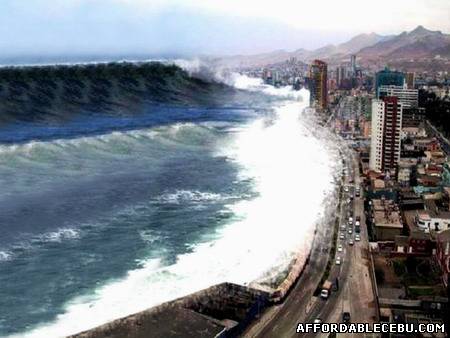
Picture of a Tsunami or Tidal Wave Coming in a City (Photo credited to suchablog.com)
Guidelines On What To Do During Tsunami
- If you are in coastal area, listen to news from radio, tv or internet when there's a tsunami alert due to earthquake
- You should move inland to higher ground immediately and stay there.
- You should stay away from the beach and never go down or come back to the beach to watch a tsunami coming in your area. Escape as quickly as possible.
- If you notice an abnormal recession in water (biglang paghupa ng tubig, in Bisaya/Cebuano - "kalit nga paghunas"), this is nature's warning that tsunami will occur due to earthquake. You should go away quickly.
- If you are in school and you hear there is a tsunami warning, you should follow the advice of teachers and other school personnel.
- If you are at home and hear there is a tsunami warning, you should make sure you entire family is aware of the warning. Your family should evacuate your house if you live in a tsunami evacuation. Move in an orderly, calm and safe manner to the evacuation site or to any safe place outside your evacuation zone. Follow the advice of local emergency and law enforcement authorities.
- Tsunamis generated in distant locations will generally give people enough time to move to higher ground. For locally generated tsunamis, where you might feel the ground shake, you may only have a few minutes to move to higher ground.
- High, multi-story, reinforced concrete hotels are located in many low-lying coastal areas. The upper floors of these hotels can provide a safe place to find refuge should there be a tsunami warning and you cannot move quickly inland to higher ground. Local Civil Defense procedures may, however, not allow this type of evacuation in your area. Homes and small buildings located in low lying coastal areas are not designed to withstand tsunami impacts. Do not stay in these structures should there be a tsunami warning.
- Offshore reefs and shallow areas may help break the force of tsunami waves, but large and dangerous waves can still be threat to coastal residents in these areas. Staying away fro all low-lying coastal areas is the safest advice when there is a tsunami warning.
Since tsunami wave activity is imperceptible or unpredictable in the open ocean, do not return to port if you are at sea and a tsunami warning has been reported in your area. Tsunamis or tidal waves can cause rapid changes in water level and unpredictable dangerous currents in harbors and ports.
If there is time to move your boat or ship from port to deep water (after you know a tsunami warning has been issued), you should weigh the following considerations:
- Most large harbors and ports are under the control of a harbor authority and/or a vessel traffic system. These authorities direct operations during periods of increased readiness (should a tsunami be expected), including the forced movement of vessels if deemed necessary. Keep in contact with the authorities should a forced movement of vessels be directed.
- Smaller ports may not be under the control of a harbor authority. If you are aware there is a tsunami warning and you have time to move your vessel to deep water, then you may want to do so in an orderly manner, in consideration of other vessels. Owners of small boats may find it safest to leave their boat at the pier and physically move to higher ground, particularly in the event of a locally generated tsunami. Concurrent severe weather conditions (rough seas outside of safe harbor) could present a greater hazardous situation to small boats, so physically moving yourself to higher ground may be the only option.
- Damaging wave activity and unpredictable currents can effect harbors for a period of time following the initial tsunami impact on the coast. Contact the harbor authority before returning to port making sure to verify that conditions in the harbor are safe for navigation and berthing.
Be aware of tsunami facts. This information could save your life! Share this knowledge with your relatives and friends. It could save their lives too!
If you have other recommendations and advices on what to do during tsunami or tidal wave, please drop it in the comments below. - https://www.affordablecebu.com/